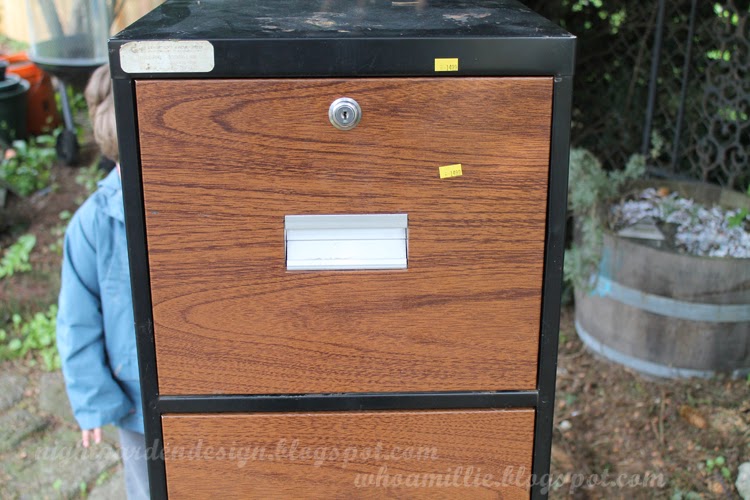We were in pretty urgent need of a four-drawer filing cabinet for organizing papers and craft supplies, but I had some standards that needed to be met:
1) Must be under 18 inches deep. This was a hard one, as many of the filing cabinets I was scouting out were quite a bit deeper, and I just don't have that kind of space right now.
2) Must be steel. (That wood pattern you see there isn't wood; it's a wood patterned paint on metal drawers. In person, it's really easy to tell the difference.) Steel has the advantage of being lighter than wood (at least, with modern steel construction) and won't let me down by turning out to be made of veneered particle board. Also, modern steel filing cabinets are pretty easy to find at thrift stores; the more modern, the less likely to have lead paint.
3) Must either have a key or have an unlocked top drawer. I passed on a giant antique three-door filing cabinet because the top drawer was locked and I knew it would be a large additional cost to get the lock drilled out. And who knows what was in the top! Could be old papers, could be dead raccoon. Never mind that the cabinet in question met neither of the previous specifications. It was gorgeous blue and had really lovely handles. But the locked cabinet drawer was a deal-breaker for $150.
I spotted this cabinet at St. Vincent de Paul on a day when yellow price tags were 25% off. After discount, I paid $11.24 for it. It met all of the above specifications, with the downside being that it's not a showpiece. I absolutely can't stand the handles.
So, I never intended to leave it as-is. I wanted something more like one of the cabinets I've pinned to my File Cabinets Pinterest board: protected bare metal, nicer hardware, with a style more vintage-industrial than 1980s-office. Sadly, I'm completely priced out of that market. Completely. I'm in more of a $50-filing-cabinet tax bracket.
Okay: so, for the first step, I brought the thing home, removed the drawers, and dug some green paint stripper out of the shed.
I was pretty optimistic after an hour, as the paint on the back was very bubbly and then scraped right off without a tantrum. I'd only used the green paint stripper on wood before (and been frustrated by the lack of results), so I was all excited about how well the rest of the cabinet would go.
You can see the back here, mostly paint-less, and the top, still painty and scabby even after giving the paint stripper another few hours to sit. (I would have let it sit overnight, but for the rain.)
The front and sides fared about the same.
This was a pretty big letdown after how easy the back was. A second run with a different brand of stripper didn't do much but make a mess and waste money.
The palm sander started out not making very good progress, but did better once I'd attached a 35-grit paper and really went at it. It was a lengthy, messy, NOISY undertaking. Sometimes you know a project is done because it's better than you could have imagined. Sometimes you know it's done because no one can listen to even one more minute of the sander vibrating a piece of sheet metal.
After sanding, I buffed it with a coat of automotive wax to protect the finish.
Here is the cabinet as it will stay, with a bit of black left, emphasizing the vintage look (I think it will do nicely).
And here is a sneak peek of what's yet to come:
If getting paint off of these cabinets wasn't such a major pita, I'd have a couple of sets of lockers in my carport stripped already. Wanna know something exciting? We've bought a sandblasting kit! I haven't tried it out yet, but I'm really looking forward to seeing how much faster and easier this project is with that tool in hand.
I'll be back soon with part two of this vintage industrial file cabinet makeover, when things really start coming together. Thanks for reading!











No comments:
Post a Comment